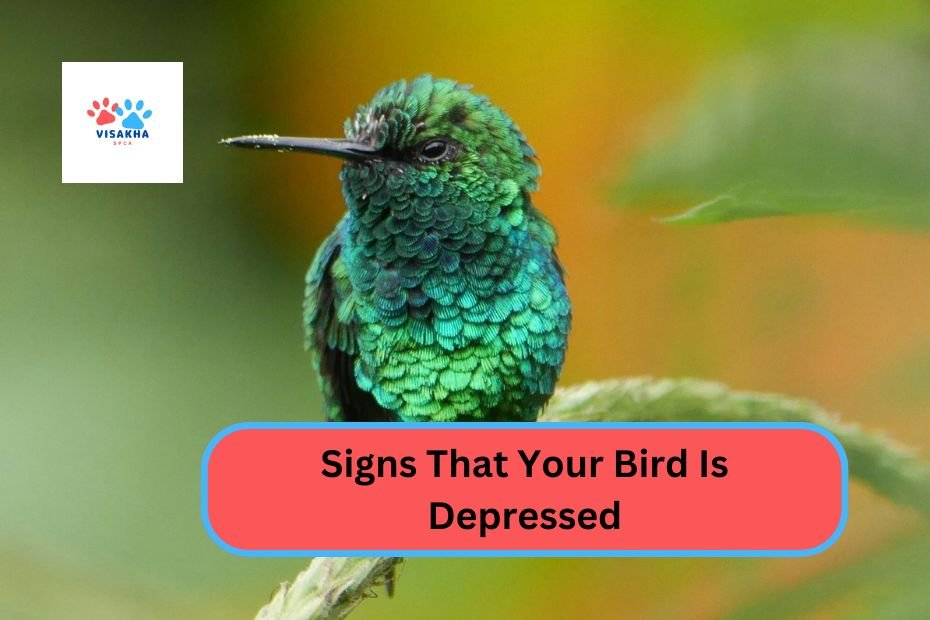Birds are highly social and intelligent creatures that can form strong bonds with their owners and environments. Just like humans, birds can experience emotions such as happiness, anxiety, and even depression. While birds may not express sadness in the same way as humans, they do exhibit specific behaviors that can indicate depression. Recognizing the signs early can help you take action to improve your bird’s emotional well-being.
This article will explore the common signs that your bird might be depressed, the potential causes of depression in birds, and what you can do to help.
Common Signs of Depression in Birds
1. Loss of Appetite
One of the first signs of depression in birds is a significant decrease in appetite. A normally energetic bird that suddenly stops eating or shows a lack of interest in its favorite foods could be experiencing emotional distress. Birds that are depressed may also start eating less frequently or completely refuse to eat.
What to Watch For:
- Refusing favorite treats or regular meals
- Weight loss
- Lack of interest in foraging activities
2. Feather Plucking or Self-Mutilation
Feather plucking is a common sign of stress or depression in birds. This behavior involves the bird pulling out its own feathers, often leaving bald patches on its body. In more severe cases, a depressed bird may resort to self-mutilation, biting or damaging its skin.
What to Watch For:
- Unusual feather loss or bald spots
- Birds pulling out their own feathers
- Damage or scarring on the skin
3. Excessive Sleeping or Lethargy
Birds are naturally energetic and curious, so if your bird starts sleeping more than usual or seems less active, it could be a sign of depression. While birds do need plenty of sleep, excessive napping during the day and a lack of interest in playing or exploring could point to an underlying emotional issue.
What to Watch For:
- Sleeping during the day when the bird is normally active
- Reluctance to move, play, or fly
- Sitting in one spot for extended periods
4. Lack of Vocalization
Birds are known for their ability to communicate through chirps, squawks, and other vocalizations. A sudden drop in vocalization or a complete silence can be an indicator that your bird is feeling down. Birds that are normally chatty may become quiet and withdrawn when they are experiencing depression.
What to Watch For:
- A typically noisy bird that becomes silent
- Less frequent calls or vocalizations
- A change in the tone of the bird’s sounds, such as more sorrowful or lower-pitched noises
5. Aggressive Behavior
Birds may express depression through increased aggression. This can manifest as biting, lunging, or being overly defensive of their space. Depression can cause frustration in birds, leading them to act out in ways that seem out of character.
What to Watch For:
- Biting or nipping when approached
- Lunging at you or other birds
- General irritability and defensiveness
6. Withdrawal or Isolation
Birds are social animals, and they typically enjoy interacting with their owners and other birds. If your bird suddenly starts isolating itself, refusing to come out of its cage, or avoiding interactions, it could be a sign of depression. A bird that is feeling down may spend more time alone, perched quietly in a corner, or hiding.
What to Watch For:
- Hiding in the cage or refusing to come out
- Avoiding interaction with humans or other birds
- Staying in one corner of the cage
7. Change in Posture or Body Language
A bird’s body language can offer important clues about its emotional state. A depressed bird may exhibit abnormal posture, such as slumped shoulders, fluffed-up feathers, or drooping wings. While some of these signs can indicate illness, they are also common in birds experiencing depression.
What to Watch For:
- Fluffed-up feathers for long periods
- Drooping wings
- Sitting with head tucked into the chest
8. Changes in Bathroom Habits
A depressed bird may experience changes in its bathroom habits, including irregular droppings or going less frequently. Stress and emotional upset can affect a bird’s digestive system, leading to constipation or diarrhea.
What to Watch For:
- Changes in the frequency of droppings
- Irregular or unusual droppings
- Lack of interest in bathroom activities
Causes of Depression in Birds
1. Loneliness or Lack of Social Interaction
Birds are social animals that require interaction with humans or other birds to thrive. Birds left alone for long periods may become lonely, which can lead to depression. Lack of stimulation and socialization is a common cause of emotional distress in birds, especially species like parrots that are used to living in flocks.
2. Changes in Environment
Birds are sensitive to changes in their surroundings. Moving to a new home, rearranging furniture, or changing the location of their cage can all be stressful for a bird. Major life changes, such as the loss of a fellow bird or a change in the family dynamic, can also cause depression.
3. Boredom and Lack of Mental Stimulation
Birds need mental stimulation to stay happy and engaged. Without toys, puzzles, or interaction, birds can become bored, leading to depression. Boredom may manifest as destructive behaviors, such as feather plucking, or lethargy.
4. Neglect or Inadequate Care
A bird that is not given proper attention, care, and a stimulating environment may become depressed. Birds need a balanced diet, social interaction, and mental stimulation to thrive. Neglect or poor care can lead to both physical and emotional problems.
5. Illness or Injury
Sometimes, a bird’s depression is linked to an underlying health issue. Birds may become withdrawn and exhibit depressive behaviors if they are experiencing pain, illness, or discomfort. Regular check-ups with an avian vet are important to rule out any health problems.
How to Help a Depressed Bird
1. Increase Social Interaction
If your bird seems lonely or withdrawn, try to spend more time interacting with them. Offer more opportunities for play, socialization, and bonding. If possible, consider getting your bird a companion, especially if your bird’s species thrives in social environments.
2. Provide Mental Stimulation
Introduce new toys, puzzles, and activities to keep your bird mentally engaged. Rotate toys regularly to prevent boredom. Offering a variety of textures, sounds, and challenges can help keep your bird’s mind active and reduce depressive symptoms.
3. Maintain a Routine
Birds thrive on routine and can become stressed if their daily schedule is inconsistent. Make sure to provide your bird with regular feeding times, play sessions, and sleep schedules. Consistency can help create a sense of security and comfort for your bird.
4. Create a Stimulating Environment
Make sure your bird’s cage or living space is enriched with perches, toys, and interactive elements. Birds love to explore and forage, so adding bird-safe branches, foraging toys, and items to climb on can help keep them engaged and happy.
5. Address Health Concerns
If you suspect your bird’s depression is linked to an illness or injury, consult an avian veterinarian. Addressing any physical discomfort can help improve your bird’s mood and behavior. It’s important to rule out any medical issues that could be contributing to the depressive symptoms.
6. Avoid Stressful Changes
Try to minimize changes in your bird’s environment. If a change is necessary, such as moving their cage, do it gradually and observe how your bird reacts. Sudden changes can cause stress and exacerbate feelings of depression.
Conclusion
Recognizing the signs of depression in birds is key to providing the care they need to stay emotionally healthy. From changes in appetite and vocalization to feather plucking and isolation, your bird’s behavior can tell you a lot about how they’re feeling. By understanding the potential causes of depression and taking proactive steps to address them, you can help your bird live a happy, fulfilled life.

